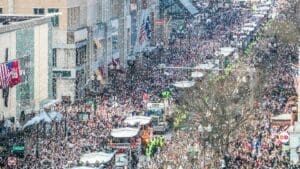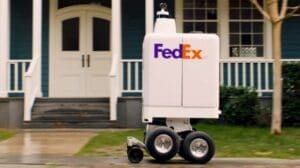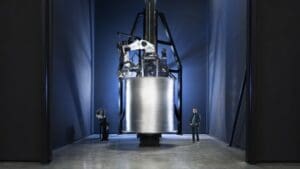 As Boston sports fans, we have become accustomed to duck boat parades. Since 2000, the city has hosted 12 rolling rallies for major sports championships, including 6 for the Patriots, 4 for the Red Sox, and 1 each for the Celtics and Bruins. And if not for a few heartbreaks along the way, that number could easily be 15 or more. This year, unless the Patriots are able to pull off some magic, we will not be hosting a duck boat parade for a sports championship. But, in some pretty cool news, yesterday, the Boston Symphony Orchestra performed 20-minute curbside recitals from the duck boats at a number of locations around the city. The stops included Symphony Hall, Angell Memorial Hospital, Reggie Lewis Center, VA Hospital Jamaica Plain, and the Boston Public Library. Audiences were restricted to 50 people due to coronavirus concerns. And now on to this week’s logistics news.
As Boston sports fans, we have become accustomed to duck boat parades. Since 2000, the city has hosted 12 rolling rallies for major sports championships, including 6 for the Patriots, 4 for the Red Sox, and 1 each for the Celtics and Bruins. And if not for a few heartbreaks along the way, that number could easily be 15 or more. This year, unless the Patriots are able to pull off some magic, we will not be hosting a duck boat parade for a sports championship. But, in some pretty cool news, yesterday, the Boston Symphony Orchestra performed 20-minute curbside recitals from the duck boats at a number of locations around the city. The stops included Symphony Hall, Angell Memorial Hospital, Reggie Lewis Center, VA Hospital Jamaica Plain, and the Boston Public Library. Audiences were restricted to 50 people due to coronavirus concerns. And now on to this week’s logistics news.
- Walmart adjusts Black Friday plans for smaller crowds
- Amazon wants to fix grocery delivery
- As FedEx makes ‘contactless’ deliveries, head of delivery robot project sees need for Roxo
- Chevrolet racks up 80,000 race miles in vehicles built with 3D printed parts
- Relativity Space makes 3D-printed rockets in ‘factory of the future’
- E2open to go public
- Macy’s converts Dover store to fulfillment center as online orders spike during COVID-19
 If 2020 has proven anything, it is that things are bound to change. And the upcoming holiday season is no exception. With Amazon holding its delayed Prime Day earlier this week, and rival retailers holding sitewide sales as well, the holiday season has pretty much kicked off more than a month early. Walmart has also announced some major changes to its Black Friday offerings, which typically see huge crowds rushing into the store to grab items on mega-sale. This year, the company will be holding “Black Friday Deals for Days” with category-specific markdowns on different days. It kicks off online November 4 with deals on toys, electronics, and home products, with the sale continuing in stores on November 7. The second event kicks off online on November 11 with mark-downs on TVs, computers, tablets, movies, music, and more, continuing in store on November 14. The final event will be kick off online on November 25 and continue in stores on Walmart’s “true” Black Friday the day after Thanksgiving. And unlike years past, there will not be a mad rush into the store. Instead, customers will need to line up single-file and stores will limit the number of people inside the store at one time.
If 2020 has proven anything, it is that things are bound to change. And the upcoming holiday season is no exception. With Amazon holding its delayed Prime Day earlier this week, and rival retailers holding sitewide sales as well, the holiday season has pretty much kicked off more than a month early. Walmart has also announced some major changes to its Black Friday offerings, which typically see huge crowds rushing into the store to grab items on mega-sale. This year, the company will be holding “Black Friday Deals for Days” with category-specific markdowns on different days. It kicks off online November 4 with deals on toys, electronics, and home products, with the sale continuing in stores on November 7. The second event kicks off online on November 11 with mark-downs on TVs, computers, tablets, movies, music, and more, continuing in store on November 14. The final event will be kick off online on November 25 and continue in stores on Walmart’s “true” Black Friday the day after Thanksgiving. And unlike years past, there will not be a mad rush into the store. Instead, customers will need to line up single-file and stores will limit the number of people inside the store at one time.
 As grocery delivery has exploded during the COVID-19 pandemic, one lingering problem many consumers have faced is finding a delivery timeframe. Amazon is working on a solution for that problem. According to Amazon, in the event that a shopper can’t secure a preferred delivery time when placing an order, that customer will receive a notice when a spot becomes available. The technology reportedly will apply to orders placed with Amazon Fresh or Whole Foods. This essentially gives a customer a virtual space holder in the queue if there are no immediate delivery windows available. The customer is then given an estimate for when a delivery timeframe will open, and once it does, they are notified and given two hours to place their order.
As grocery delivery has exploded during the COVID-19 pandemic, one lingering problem many consumers have faced is finding a delivery timeframe. Amazon is working on a solution for that problem. According to Amazon, in the event that a shopper can’t secure a preferred delivery time when placing an order, that customer will receive a notice when a spot becomes available. The technology reportedly will apply to orders placed with Amazon Fresh or Whole Foods. This essentially gives a customer a virtual space holder in the queue if there are no immediate delivery windows available. The customer is then given an estimate for when a delivery timeframe will open, and once it does, they are notified and given two hours to place their order.
 COVID-19 has also ramped up the need for contactless delivery options for consumers. FedEx has implemented a number of changes to its normal delivery protocols during the pandemic, such as eliminating signature requirements for most packages and sending photos as proof of delivery. The company is also developing an autonomous delivery robot named Roxo, which would remove point-of-delivery contact from the equation entirely. According to FedEx, Roxo is not suited for high density routes that involve multiple stops for deliveries. Instead, the robot is geared towards same-day, on-demand delivery. These deliveries, where a truck brings a single package is inefficient, and FedEx plans to use the autonomous bots to make these deliveries instead.
COVID-19 has also ramped up the need for contactless delivery options for consumers. FedEx has implemented a number of changes to its normal delivery protocols during the pandemic, such as eliminating signature requirements for most packages and sending photos as proof of delivery. The company is also developing an autonomous delivery robot named Roxo, which would remove point-of-delivery contact from the equation entirely. According to FedEx, Roxo is not suited for high density routes that involve multiple stops for deliveries. Instead, the robot is geared towards same-day, on-demand delivery. These deliveries, where a truck brings a single package is inefficient, and FedEx plans to use the autonomous bots to make these deliveries instead.
Over the last few years, there has been a lot of buzz around the use of 3D-printed components to alleviate supply chain bottlenecks. We are starting to see more and more use cases of companies taking out these supply chain complexities with 3D-printed items. Chevrolet’s motorsports division has announced its teams have raced over 80,000 miles of competition this season in vehicles containing 3D printed parts. According to the announcement, Chevrolet’s Corvette, INDYCAR, NASCAR Camaro, and Silverado race teams have all contributed to the miles, using 3D printing for components such as oil tanks, air conditioning cooling boxes, integrated hydration systems, headlight assemblies, and power steering pump brackets, among others. According to Audley Brown, GM director of Materials Engineering, Additive Design and Manufacturing:
“By utilizing 3D printed parts, Chevrolet Motorsports is demonstrating the many benefits of additive manufacturing, including manufacturing efficiencies, mass reduction, parts consolidation, creativity and cost savings. 3D printed parts can offer equal strength and durability to cast or milled components, which is critical for product development and design.”
 Not to be outdone by motorsports, rocket builder Relativity Space is turning to 3D-printed components as well. The company recently moved into a new headquarters in Long Beach, CA in preparation for its first launch in late 2021. Relativity Space is building its first iteration of its Terran 1 rocket. To do so, the company is relying on 3D printing to manufacture about 95 percent of its parts, using 3D printers that were developed in-house. Relativity is now on its third generation of 3D-printers, capable of manufacturing a single piece of metal up to 32 feet tall – as high as the new ceiling allows. Terran 1 will stand about 115 feet tall on the launchpad, so Relativity is building the rocket in sections and then using a specialized “horizontal conjoining system” to fit the pieces together.
Not to be outdone by motorsports, rocket builder Relativity Space is turning to 3D-printed components as well. The company recently moved into a new headquarters in Long Beach, CA in preparation for its first launch in late 2021. Relativity Space is building its first iteration of its Terran 1 rocket. To do so, the company is relying on 3D printing to manufacture about 95 percent of its parts, using 3D printers that were developed in-house. Relativity is now on its third generation of 3D-printers, capable of manufacturing a single piece of metal up to 32 feet tall – as high as the new ceiling allows. Terran 1 will stand about 115 feet tall on the launchpad, so Relativity is building the rocket in sections and then using a specialized “horizontal conjoining system” to fit the pieces together.
![]() E2open, a network-based provider of 100 percent cloud-based, end-to-end supply chain management software, announced that it has entered into a business combination agreement with CC Neuberger Principal Holdings I, a publicly traded special purpose acquisition company. Upon closing of the transaction, E2open will become a publicly traded company, and it is expected that its common stock will be listed on the New York Stock Exchange under the symbol “ETWO”. The transaction has been unanimously approved by the Board of Directors of CC Neuberger Principal Holdings I, as well as the Board of Directors of E2open, and is subject to the satisfaction of customary closing conditions, including the approval of the shareholders of CC Neuberger Principal Holdings I. The total equity investment of $1.1 billion raised in this transaction will be used to pay down existing debt, purchase a portion of the equity owned by existing E2open owners and conservatively capitalize the Company’s balance sheet. Upon the closing of the transaction, CC Neuberger Principal Holdings I will domesticate as a Delaware corporation and the name of CC Neuberger Principal Holdings I will be changed to E2open Parent Holdings.
E2open, a network-based provider of 100 percent cloud-based, end-to-end supply chain management software, announced that it has entered into a business combination agreement with CC Neuberger Principal Holdings I, a publicly traded special purpose acquisition company. Upon closing of the transaction, E2open will become a publicly traded company, and it is expected that its common stock will be listed on the New York Stock Exchange under the symbol “ETWO”. The transaction has been unanimously approved by the Board of Directors of CC Neuberger Principal Holdings I, as well as the Board of Directors of E2open, and is subject to the satisfaction of customary closing conditions, including the approval of the shareholders of CC Neuberger Principal Holdings I. The total equity investment of $1.1 billion raised in this transaction will be used to pay down existing debt, purchase a portion of the equity owned by existing E2open owners and conservatively capitalize the Company’s balance sheet. Upon the closing of the transaction, CC Neuberger Principal Holdings I will domesticate as a Delaware corporation and the name of CC Neuberger Principal Holdings I will be changed to E2open Parent Holdings.
COVID-19 has shifted the purchasing patterns and behaviors of consumers around the world. While e-commerce became a necessity as the onset of the pandemic due to brick and mortar stores being closed, once stores were allowed to re-open, many consumers continued to shop online. As a result, many retailers have had to shift gears on how they fulfill items. Macy’s has decided to run a test at two of its nearly 550 stores. The stores, located in Dover, DE and Littleton, CO, will be closed to shoppers and will instead be used as fulfillment centers for the holiday season. The stores will still facilitate in-store and curbside pickup orders, returns, bill pay and other customer services, while acting primarily as a fulfillment center for online orders. In a statement, the company said the pilot is in response to an uptick in online orders shipped directly to customers or their nearest store.
Want to learn more about omni-channel fulfillment? Learn how your omni-channel fulfillment operations measure up. Take our latest survey to find out.
That’s all for this week. Enjoy the weekend and the song of the week, the Boston Pops’ version of I’m Shipping Up to Boston.

















